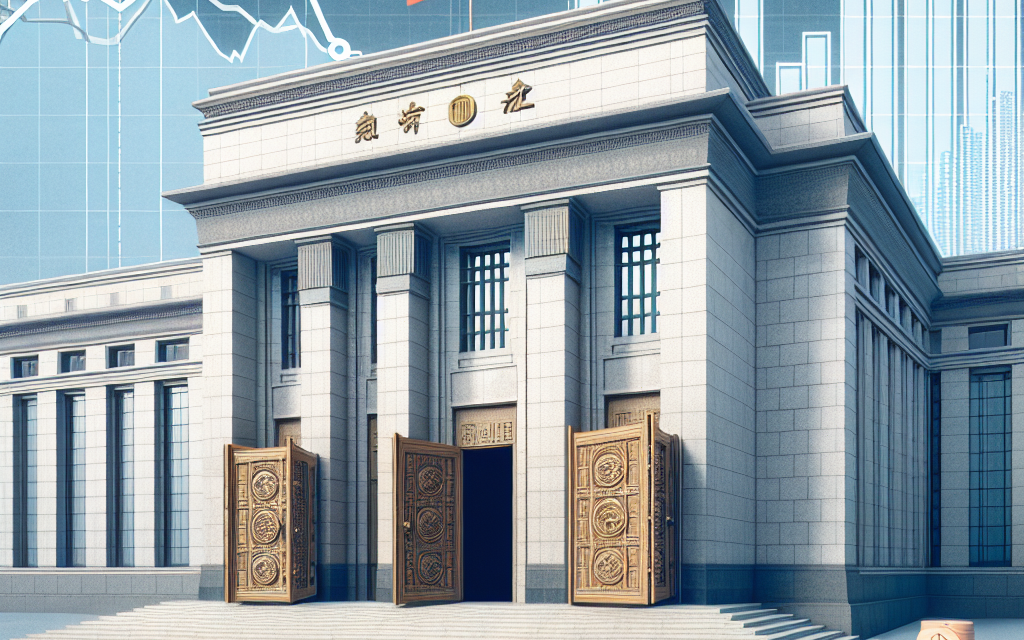“China’s Central Bank Presses Pause: Bond Buying Activities Halted.”
Introduction
China’s central bank has recently announced a halt to its bond buying activities, a significant move that reflects shifting monetary policy dynamics in the country. This decision comes amid concerns over rising debt levels and the need to stabilize the financial market. By suspending its bond purchases, the People’s Bank of China aims to manage liquidity more effectively and address inflationary pressures, while also signaling a potential shift towards a more cautious approach in its economic stimulus measures. The implications of this decision are expected to reverberate through the financial markets, influencing investor sentiment and shaping the future trajectory of China’s economic policy.
Impact of China’s Central Bank Halting Bond Purchases
The recent decision by China’s central bank to halt its bond purchasing activities has significant implications for both the domestic and global financial landscape. This move, which comes amid a backdrop of economic uncertainty and fluctuating market conditions, signals a shift in the central bank’s monetary policy approach. By ceasing bond purchases, the People’s Bank of China (PBOC) aims to address various economic challenges, including rising inflation and the need for fiscal discipline.
As the central bank steps back from the bond market, one immediate effect is the potential increase in bond yields. When a central bank actively purchases bonds, it typically drives prices up and yields down due to heightened demand. Conversely, a reduction in purchasing activity can lead to a decrease in demand, resulting in lower bond prices and higher yields. This shift could affect government financing costs, as higher yields may lead to increased borrowing expenses for the Chinese government. Consequently, this could impact public spending and investment initiatives, which are crucial for sustaining economic growth.
Moreover, the cessation of bond purchases may also influence investor sentiment. Market participants often view central bank actions as indicators of future economic conditions. Therefore, the PBOC’s decision could be interpreted as a signal of tightening monetary policy, which might lead to increased volatility in financial markets. Investors may reassess their portfolios, potentially reallocating assets in response to anticipated changes in interest rates and economic growth prospects. This reassessment could result in capital outflows from China, as investors seek more favorable returns elsewhere, thereby impacting the stability of the Chinese yuan.
In addition to domestic repercussions, the halt in bond purchases could have broader implications for global markets. China is a significant player in the international bond market, and any changes in its purchasing behavior can reverberate across borders. For instance, if Chinese investors reduce their holdings of foreign bonds in response to higher domestic yields, this could lead to increased borrowing costs for other countries. Furthermore, as global investors adjust their strategies in light of China’s policy shift, we may witness fluctuations in currency values and commodity prices, particularly in markets closely tied to China’s economic performance.
Furthermore, the decision to halt bond purchases may reflect the central bank’s broader strategy to combat inflationary pressures. As inflation rates rise, central banks worldwide are grappling with the challenge of balancing economic growth with price stability. By stepping back from bond purchases, the PBOC may be signaling its commitment to curbing inflation, which could have long-term benefits for the economy. However, this approach also carries risks, as it may slow down economic recovery efforts, particularly in sectors that rely heavily on government support.
In conclusion, the halting of bond purchases by China’s central bank is a pivotal development that carries far-reaching consequences. It not only affects domestic bond markets and investor behavior but also has the potential to influence global financial dynamics. As the PBOC navigates the complexities of economic management, the implications of this decision will likely unfold over time, warranting close attention from policymakers, investors, and analysts alike. The interplay between monetary policy and economic conditions will remain a critical area of focus as stakeholders seek to understand the evolving landscape shaped by this significant policy shift.
Implications for China’s Economic Growth
China’s recent decision to halt bond buying activities by its central bank has raised significant concerns regarding the implications for the nation’s economic growth. This strategic shift comes at a time when the Chinese economy is grappling with various challenges, including sluggish domestic demand, a property market in distress, and external pressures from global economic uncertainties. The cessation of bond purchases, which had been a tool for injecting liquidity into the financial system, signals a pivotal moment in China’s monetary policy and its broader economic trajectory.
To understand the implications of this decision, it is essential to consider the role that bond buying has played in supporting economic activity. By purchasing government bonds, the central bank has been able to lower interest rates, thereby encouraging borrowing and investment. This mechanism has been particularly crucial in stimulating growth during periods of economic slowdown. However, the halt in these activities suggests a shift towards a more cautious approach, potentially indicating that the central bank is prioritizing stability over aggressive stimulus measures. This change could lead to higher borrowing costs, which may dampen investment and consumer spending, further exacerbating the existing economic challenges.
Moreover, the decision to stop bond buying may reflect the central bank’s concerns about rising inflation and asset bubbles. As the economy begins to recover from the impacts of the COVID-19 pandemic, inflationary pressures have started to emerge, driven by supply chain disruptions and increased demand. By curbing bond purchases, the central bank may be attempting to rein in inflationary expectations, which could otherwise undermine consumer confidence and spending. However, this balancing act poses risks; if inflation is not managed carefully, it could lead to a more pronounced slowdown in economic growth.
In addition to domestic factors, external influences also play a critical role in shaping China’s economic landscape. The global economic environment remains uncertain, with geopolitical tensions and trade disputes affecting China’s export-driven economy. As the central bank steps back from bond buying, the potential for increased volatility in financial markets could further complicate the situation. Investors may react to the perceived tightening of monetary policy by reallocating their portfolios, which could lead to fluctuations in capital flows and exchange rates. Such volatility may hinder foreign investment, a vital component of China’s growth strategy.
Furthermore, the halt in bond buying could have implications for the real estate sector, which has been a significant driver of economic growth in recent years. The property market has already been under strain due to regulatory crackdowns and rising debt levels among developers. With higher interest rates resulting from reduced bond purchases, financing costs for real estate projects may increase, leading to a slowdown in construction and related activities. This slowdown could have a cascading effect on employment and consumer spending, further dampening economic growth.
In conclusion, China’s central bank’s decision to halt bond buying activities carries profound implications for the nation’s economic growth. While it may be a necessary step to address inflationary concerns and maintain financial stability, the potential consequences include higher borrowing costs, reduced investment, and increased volatility in financial markets. As China navigates these challenges, the balance between stimulating growth and ensuring stability will be crucial in determining the future trajectory of its economy. The coming months will be critical in assessing how this policy shift unfolds and its impact on both domestic and global economic landscapes.
Market Reactions to the Central Bank’s Decision
The recent decision by China’s central bank to halt its bond buying activities has sent ripples through the financial markets, prompting a range of reactions from investors and analysts alike. This move, which is seen as a significant shift in monetary policy, has raised questions about the future direction of interest rates and the overall economic landscape in China. As market participants digest the implications of this decision, various sectors are responding in distinct ways, reflecting the complexities of the current economic environment.
Initially, the cessation of bond purchases has led to an increase in bond yields, as the demand for government securities diminishes in the absence of central bank support. Investors, who had previously relied on the central bank’s interventions to stabilize the bond market, are now reassessing their positions. Consequently, this has resulted in a sell-off of bonds, particularly in the longer-dated maturities, where yields have risen sharply. The upward pressure on yields is indicative of a market that is recalibrating itself in response to the new policy stance, which could signal a tightening of financial conditions in the near term.
Moreover, the halt in bond buying has implications for the broader equity markets. As bond yields rise, the attractiveness of fixed-income investments increases relative to equities, leading some investors to shift their portfolios away from stocks. This shift has been particularly pronounced in sectors that are sensitive to interest rate changes, such as real estate and utilities, which have experienced notable declines in their stock prices. Conversely, sectors that are less affected by rising rates, such as technology and consumer discretionary, have shown resilience, albeit with increased volatility as investors weigh the potential for slower economic growth against the backdrop of higher borrowing costs.
In addition to the immediate market reactions, analysts are closely monitoring the potential long-term effects of the central bank’s decision. Some experts argue that the halt in bond buying could be a precursor to a broader tightening cycle, which may include interest rate hikes in the future. This perspective is supported by the central bank’s recent statements indicating a focus on controlling inflation and stabilizing the currency. As a result, market participants are beginning to price in the possibility of tighter monetary policy, which could further influence investment strategies across various asset classes.
Furthermore, the decision has raised concerns about the overall health of the Chinese economy. With growth already showing signs of slowing, the withdrawal of central bank support could exacerbate existing challenges, particularly in sectors that are heavily reliant on credit. Investors are now more vigilant about economic indicators, such as manufacturing data and consumer spending, as these will provide critical insights into the resilience of the economy in the face of tightening financial conditions.
In conclusion, the central bank’s decision to halt bond buying activities has triggered a multifaceted response across financial markets. As bond yields rise and equity markets react, investors are grappling with the implications of this policy shift. The potential for tighter monetary policy looms large, prompting a reevaluation of investment strategies and a heightened focus on economic fundamentals. As the situation unfolds, market participants will continue to navigate the complexities of a changing economic landscape, seeking to balance risk and opportunity in an increasingly uncertain environment.
Analysis of China’s Monetary Policy Shift
In a significant shift in monetary policy, China’s central bank has recently announced the cessation of its bond-buying activities, a move that has sparked considerable discussion among economists and market analysts. This decision marks a pivotal moment in the country’s economic strategy, reflecting a broader reassessment of monetary conditions in response to evolving domestic and global economic landscapes. As the People’s Bank of China (PBOC) navigates the complexities of economic recovery, this policy adjustment raises important questions about the implications for liquidity, interest rates, and overall economic growth.
To understand the rationale behind this decision, it is essential to consider the context in which it was made. Over the past few years, the PBOC has engaged in extensive bond purchases as part of its efforts to stimulate the economy, particularly in the wake of the COVID-19 pandemic. These measures were aimed at lowering borrowing costs, enhancing liquidity in the financial system, and supporting key sectors that were adversely affected by the economic downturn. However, as the economy began to show signs of recovery, the central bank faced the challenge of balancing continued support with the need to prevent overheating and inflationary pressures.
The halt in bond buying can be interpreted as a signal that the PBOC is shifting its focus towards tightening monetary policy. This transition is particularly noteworthy given the global economic environment, where central banks in various countries are grappling with rising inflation and the need to recalibrate their monetary policies. By halting bond purchases, the PBOC may be attempting to align its strategy with these global trends while also addressing domestic concerns about asset bubbles and excessive leverage in the financial system.
Moreover, this policy shift could have significant implications for interest rates. With the central bank stepping back from bond markets, there is a likelihood that yields on government bonds may rise, reflecting a decrease in demand. Higher yields could, in turn, lead to increased borrowing costs for businesses and consumers, potentially dampening investment and consumption. As such, the PBOC’s decision to halt bond buying may serve as a double-edged sword, as it seeks to rein in excesses while also ensuring that economic growth remains on a sustainable trajectory.
In addition to interest rate dynamics, the cessation of bond purchases may also impact investor sentiment and market stability. Financial markets often react sensitively to changes in central bank policies, and the announcement of a halt in bond buying could lead to increased volatility as investors reassess their positions. This uncertainty may be compounded by other factors, such as geopolitical tensions and supply chain disruptions, which continue to pose challenges for the Chinese economy.
As the PBOC navigates this complex landscape, it will be crucial for policymakers to communicate their intentions clearly to mitigate market disruptions and maintain confidence among investors. The central bank’s ability to strike a balance between tightening monetary policy and supporting economic growth will be closely monitored by both domestic and international stakeholders. Ultimately, the decision to halt bond buying reflects a broader strategic recalibration, one that underscores the delicate interplay between monetary policy, economic stability, and market dynamics in an increasingly interconnected world. As China moves forward, the implications of this policy shift will undoubtedly shape the trajectory of its economic landscape in the months and years to come.
Future of China’s Bond Market Post-Halt
The recent decision by China’s central bank to halt its bond-buying activities has raised significant questions about the future of the country’s bond market. This move, which comes amid a complex economic landscape, signals a shift in monetary policy that could have far-reaching implications for investors, businesses, and the overall economy. As the central bank steps back from its role as a major purchaser of bonds, market participants are left to ponder the potential consequences of this strategic pivot.
To begin with, the cessation of bond purchases by the central bank may lead to increased volatility in the bond market. Historically, central banks have played a stabilizing role by providing liquidity and supporting bond prices through their purchasing activities. With the central bank withdrawing from this role, investors may experience heightened uncertainty, prompting them to reassess their strategies. Consequently, this could result in fluctuations in bond yields, as supply and demand dynamics shift in response to the absence of central bank support.
Moreover, the halt in bond buying could signal a broader tightening of monetary policy. As the central bank steps back, it may be indicative of a desire to combat inflationary pressures or to normalize interest rates after a prolonged period of accommodative monetary policy. This shift could lead to higher borrowing costs for businesses and consumers alike, as the cost of financing through bonds becomes more expensive. In turn, this may dampen economic growth, as companies may be less inclined to invest in expansion or new projects when faced with increased capital costs.
In addition to these immediate effects, the future of China’s bond market may also be influenced by the response of foreign investors. The bond market has seen a growing influx of foreign capital in recent years, driven by the inclusion of Chinese bonds in global indices and the pursuit of diversification by international investors. However, the central bank’s decision to halt bond purchases could raise concerns about the stability and attractiveness of the market. If foreign investors perceive increased risk or volatility, they may reconsider their positions, potentially leading to capital outflows that could further exacerbate market instability.
Furthermore, the halt in bond buying may prompt a reevaluation of fiscal policy as well. With the central bank stepping back, the onus may shift to the government to stimulate the economy through fiscal measures. This could involve increased public spending or infrastructure projects aimed at bolstering economic growth. However, the effectiveness of such measures will depend on the government’s ability to implement them efficiently and the overall economic environment.
As the bond market navigates this new landscape, it is essential for investors to remain vigilant and adaptable. Understanding the implications of the central bank’s decision will be crucial for making informed investment choices. Additionally, market participants should closely monitor economic indicators and government policy announcements, as these will provide valuable insights into the evolving dynamics of the bond market.
In conclusion, the halt of bond-buying activities by China’s central bank marks a significant turning point for the country’s bond market. While it may introduce volatility and uncertainty, it also opens the door for potential shifts in fiscal policy and investment strategies. As stakeholders adjust to this new reality, the future of China’s bond market will depend on a delicate balance between monetary policy, economic growth, and investor sentiment. The coming months will be critical in determining how these factors interplay and shape the trajectory of the bond market in China.
Comparison with Global Central Bank Strategies
In recent developments, China’s central bank has made the significant decision to halt its bond-buying activities, a move that has drawn attention not only within the country but also on the global stage. This decision stands in stark contrast to the strategies employed by many central banks around the world, particularly in the wake of the economic challenges posed by the COVID-19 pandemic. As countries grapple with inflationary pressures and the need for economic stimulus, the divergence in approaches raises important questions about the effectiveness and implications of such policies.
To begin with, it is essential to understand the context in which China’s central bank has made this decision. In the aftermath of the pandemic, many central banks, including the Federal Reserve in the United States and the European Central Bank, adopted aggressive bond-buying programs as part of their quantitative easing strategies. These measures were designed to lower interest rates, stimulate borrowing, and ultimately support economic recovery. By purchasing government bonds, these institutions aimed to inject liquidity into the financial system, thereby encouraging spending and investment. In contrast, China’s central bank has opted to step back from such interventions, signaling a shift in its monetary policy stance.
This divergence can be attributed to several factors, including differing economic conditions and policy objectives. While many Western economies are still grappling with the aftereffects of the pandemic, including supply chain disruptions and rising inflation, China’s economy has shown signs of recovery. However, this recovery has not been without its challenges, including concerns over debt levels and property market instability. As a result, the People’s Bank of China appears to be prioritizing financial stability over aggressive stimulus measures, a strategy that reflects a more cautious approach to economic management.
Moreover, the decision to halt bond buying aligns with a broader trend observed among some central banks that are beginning to taper their asset purchase programs. For instance, the Bank of England and the Reserve Bank of Australia have also signaled intentions to reduce their bond-buying activities as they navigate the complexities of post-pandemic recovery. This shift indicates a growing consensus among central banks that, while stimulus measures were necessary during the height of the crisis, a return to more normalized monetary policy is essential for long-term economic health.
Furthermore, the implications of China’s decision extend beyond its borders, influencing global financial markets and investor sentiment. As investors adjust their expectations regarding interest rates and monetary policy in China, there may be ripple effects on global bond markets. The halt in bond buying could lead to increased yields on Chinese government bonds, prompting investors to reassess their portfolios and potentially reallocating capital to other markets. This dynamic underscores the interconnectedness of global financial systems and the importance of monitoring central bank actions across different jurisdictions.
In conclusion, China’s central bank’s decision to halt bond-buying activities marks a notable departure from the strategies employed by many of its global counterparts. While the motivations behind this decision are rooted in the unique economic landscape of China, it also reflects a broader trend among central banks to recalibrate their approaches in response to evolving economic conditions. As the world continues to navigate the complexities of recovery, the implications of these divergent strategies will undoubtedly shape the future of monetary policy and economic stability on a global scale.
Investor Sentiment Following the Bond Buying Suspension
The recent decision by China’s central bank to halt its bond buying activities has sent ripples through the financial markets, prompting a reevaluation of investor sentiment. This move, which comes amid a backdrop of economic uncertainty and fluctuating growth rates, has raised questions about the future trajectory of the Chinese economy and its implications for global markets. As investors digest this development, their reactions are shaped by a complex interplay of factors, including expectations for monetary policy, inflationary pressures, and overall economic stability.
Initially, the suspension of bond purchases has led to a cautious approach among investors. Many are interpreting this action as a signal that the central bank may be shifting its focus towards tightening monetary policy, a move that could have significant ramifications for liquidity in the market. Consequently, this has resulted in a rise in bond yields, as investors adjust their portfolios in anticipation of higher borrowing costs. The immediate reaction has been a sell-off in government bonds, reflecting a broader concern about the potential for increased volatility in the fixed-income market.
Moreover, the halt in bond buying has also influenced equity markets, where investor sentiment has turned more bearish. As bond yields rise, the attractiveness of equities may diminish, particularly for sectors that are sensitive to interest rate changes. Investors are now weighing the potential for reduced corporate earnings against the backdrop of higher financing costs. This uncertainty has led to a more cautious investment approach, with many market participants opting to reassess their risk exposure and consider reallocating their assets in response to the changing landscape.
In addition to these immediate market reactions, the suspension of bond purchases has sparked broader discussions about the health of the Chinese economy. Analysts are closely monitoring key economic indicators, such as GDP growth, inflation rates, and consumer spending, to gauge the underlying strength of the economy. The central bank’s decision may be perceived as a response to rising inflationary pressures, which have been a growing concern in recent months. As such, investors are increasingly focused on how these dynamics will influence future monetary policy decisions and the overall economic outlook.
Furthermore, the global context cannot be overlooked. As China plays a pivotal role in the world economy, shifts in its monetary policy can have far-reaching implications for international markets. Investors are particularly attuned to how this suspension of bond buying might affect capital flows, trade relationships, and currency valuations. The interconnectedness of global financial systems means that changes in China’s economic policy can reverberate across borders, influencing investor sentiment in other regions.
In conclusion, the suspension of bond buying activities by China’s central bank has elicited a multifaceted response from investors, characterized by caution and a reevaluation of risk. As market participants navigate this new landscape, they are grappling with the implications for both domestic and global economic conditions. The evolving sentiment reflects a broader uncertainty about the future, as investors seek to balance potential opportunities against the backdrop of rising yields and shifting monetary policy. Ultimately, how this situation unfolds will depend on a myriad of factors, including the central bank’s future actions and the resilience of the Chinese economy in the face of these challenges.
Q&A
1. **Question:** Why did China’s central bank halt bond buying activities?
**Answer:** The central bank halted bond buying activities to manage liquidity and control rising debt levels in the economy.
2. **Question:** What impact does halting bond purchases have on the bond market?
**Answer:** It can lead to increased bond yields and reduced demand for government bonds, potentially raising borrowing costs.
3. **Question:** How does this decision affect investors?
**Answer:** Investors may reassess their strategies, leading to volatility in the bond market and a shift towards other asset classes.
4. **Question:** What are the potential economic implications of this action?
**Answer:** It may slow down economic growth by tightening financial conditions and reducing available credit.
5. **Question:** How might this decision influence the Chinese yuan?
**Answer:** The halt in bond buying could lead to a stronger yuan if it signals tighter monetary policy, attracting foreign investment.
6. **Question:** What are the central bank’s goals with this policy change?
**Answer:** The goals include stabilizing the financial system, curbing excessive borrowing, and ensuring sustainable economic growth.
7. **Question:** How have market participants reacted to this news?
**Answer:** Market participants have shown caution, with some adjusting their portfolios in anticipation of higher interest rates and reduced liquidity.
Conclusion
China’s Central Bank halting bond buying activities signals a shift in monetary policy aimed at addressing economic challenges, potentially leading to increased market volatility and impacting liquidity. This decision may reflect concerns over rising debt levels and inflation, indicating a cautious approach to managing economic growth while balancing financial stability. The move could also influence investor sentiment and affect the broader financial landscape in China.





